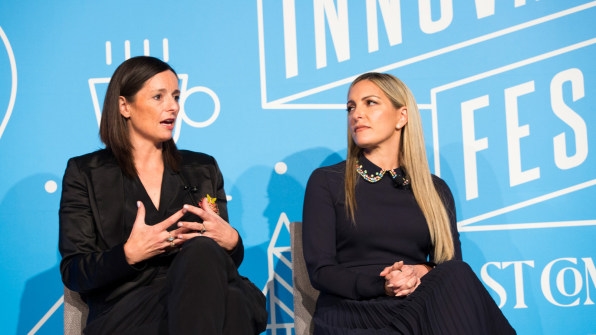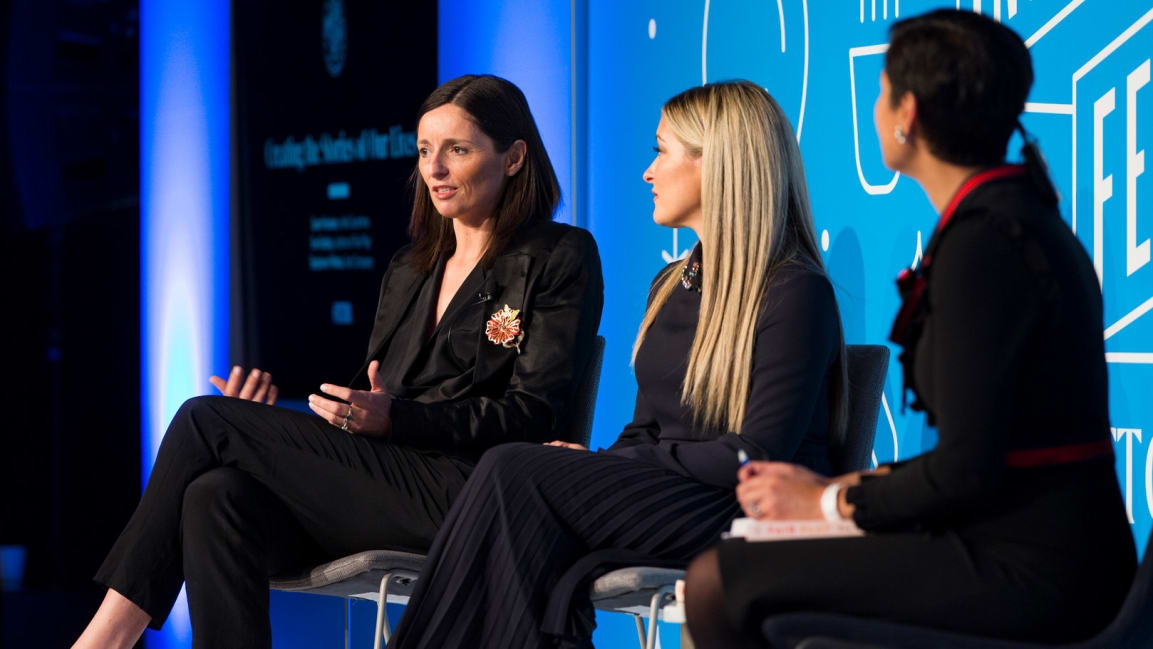Eve Rodsky’s deck of cards could help you find domestic bliss
Eve Rodsky was fed up. For years she, like many other women, had shouldered the burden of invisible labor at home. Rodsky, a Harvard-educated lawyer and organizational management specialist who advises families and charitable foundations, was tired of being the “she-fault” parent. So she started a spreadsheet.
“It was a 98-tab Excel spreadsheet that I titled ‘Shit I do,’” Rodsky said during a panel at the Fast Company Innovation Festival (November 15, 2019). “After months and months of crowdsourcing this beautiful, giant spreadsheet, I sent this to my husband and said, ‘Can’t wait to discuss.’”
Rodsky shared the spreadsheet on Facebook. Soon, she was receiving messages from strangers who had seen it, detailing the domestic indignities they faced. “A woman I didn’t know texted me saying, ‘Hey, I received your spreadsheet. At this rate, I’m not going to stay in my marriage,’” Rodsky said. She wanted to channel that frustration into something productive. After talking to hundreds of men and women, Rodsky realized she could apply organizational management principles to the home.
When Sarah Harden, the CEO of Reese Witherspoon’s media and production company, Hello Sunshine, met Rodsky, she realized Rodsky was onto something novel. “After 40 to 50 years of talking about the problems, she was working on a solution,” said Harden, who shared the stage with Rodsky at the Innovation Festival. “There’s a lot of problems for women in the world. [At Hello Sunshine], we assume a woman has agency. We like to be on the problem-solving end of the conversation rather than wallowing.”

[Photo: Celine Grouard for Fast Company]
The result is Rodsky’s book, Fair Play: A Game-Changing Solution for When You Have Too Much to Do (and More Life to Live), which came out in October. (Hello Sunshine inked a unique deal with Rodsky as a venture partner, which means the company helped sell the book to a publisher and will take a cut of its profits.) A key piece of Rodsky’s solution is gamifying the notion of fair play with a set of cards. “Cards are really valuable as a mediation tool,” she said. “So this is based on a 100 card game. You’re holding cards that represent all that you do for your home and family.” Here’s how Rodsky believes the cards can help couples navigate domestic balance:
To help you talk about home life
“I am asking women to initiate these conversations,” Rodsky said. “What I found over and over again, regardless of socioeconomic status and ethnicity, was a reluctance to have a conversation about home life. Women would say to me, ‘We just don’t talk about these things—they’re too triggering.’” But Rodsky pointed out that many women already do communicate their frustrations in other ways. One woman she heard from shamed her husband on an Instagram account called “Shit my husband doesn’t pick up.” Another said she dumps her husband’s clothes on his pillow when he forgets to take them out of the dryer.
Using the construct of fair play and the cards—each of which represent a household chore or responsibility—gives women the tools to have those conversations in a more constructive way. “I’m not asking for a conversation start,” Rodsky said. “I’m asking for a conversation shift.” The cards can also mitigate some of the emotion driving those conversations—for many men, the feeling of being nagged, and for women, the weight of feeling like they’re running their household.
Plus, the cards can be reshuffled at any point, especially if one task is particularly onerous or undesirable. Harden and her husband, for example, reevaluate their cards every few weeks. “Some of the cards are shit,” Harden said. “Like dishes. We’ve tried to give that to our children.”
To help you take full ownership
Rodsky’s approach emphasizes taking full ownership of a task, rather than focusing on equally distributing tasks. The person holding a card is in charge of the “CPE” of the task in question—conception, planning, and execution.
Often, a spouse may come in at the execution stage. “My husband loves sports, and he was like, ‘I hold the sports card in our family,’” Harden said. “He believed it, and I believed it. What that meant for him was that he coached one of my kid’s teams and went to all of the games.” But when they sat down to talk about conception and planning, Harden realized she was the one tracking when little league and soccer sign-up happened; she ordered cleats from Amazon and worried about the snack mom spreadsheet.
Since turning to fair play, Harden’s husband takes true ownership of the sports card, from signing their children up for sports to figuring out how they get to practices. “I do not spend a minute in my marriage thinking about sports anymore,” she said. “But I watch all my kids’ games.”
To help you find “unicorn space”
The ultimate goal of redistributing domestic work, according to Rodsky, is to free up time for what she calls “unicorn space”—the stuff that might feel like a luxury or pipe dream to most parents. By using the cards, Rodsky believes parents can strive to carve out time for things beyond parenting and work, like adult friendships and self-care. “This is about making time for the things we actually care about—who we were before we had kids,” she said. “What are our passions and purpose, beyond being a parent and a partner and a worker? The more we spend time arguing about who does what, the less time we have for the things that truly matter.”
(44)



